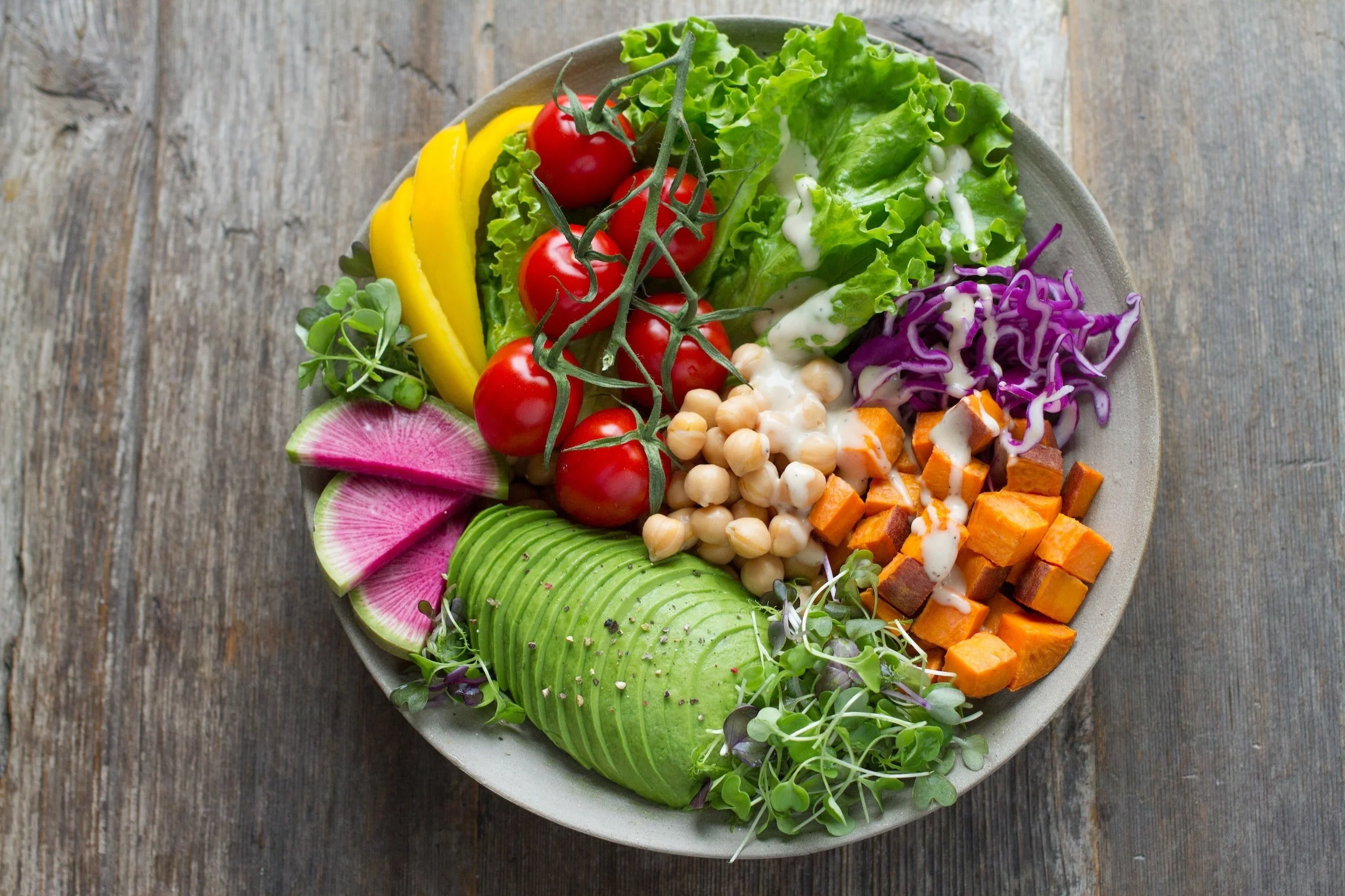A Guide to Plant-based Eating
/Have you ever wanted to be more plant-based but didn’t know where to start?
Being plant-based simply means that you are predominantly plant-focused. This doesn’t mean that you are not allowed to eat any animal products, but that you choose to incorporate more whole foods and plants into your diet. If animal protein usually takes center stage, you can slowly transition to eating more plants by making three-quarters of your plate plant-based. You may eat plant-based 3 out of 7 days or choose to make every meal come from plants. You have the power to create whatever works for you and your health!
Plant-based is a word commonly used and is seen on advertisements, packaged goods, social media, and even restaurant menus. It has gained a lot of traction as people become more aware and proactive about their health and the environment. So, let’s talk about what it means to be plant-based.
A plant-based diet is primarily made up of fruits, vegetables, whole grains, legumes, nuts, and seeds. Research has consistently shown that a diet rich in whole plant foods promotes numerous health benefits and prevents chronic disease.[1] Plants are packed with fiber, vitamins, minerals, and phytochemicals, including antioxidants, which are substances that prevent cell damage. Fruits and vegetables are rich sources of anti-inflammatory phytochemicals and provide a wide array of essential vitamins and minerals, the more varied and colorful the fruits and vegetables the better. Nutrition recommendations around the world promote a plate with at least half of your food coming from fruits and vegetables every meal.
Whole grains are minimally processed and contain the three parts of the kernel: bran, germ, and endosperm. The removal of the bran and germ during the refining process strips the grain of fiber, health-promoting fats, and some vitamins and minerals leaving the starch behind.
Legumes are a family of plants that produce a pod containing seeds inside. These include soybeans, peanuts, lentils, peas, chickpeas, and beans. In addition to having heart healthy fats and providing plant protein, nuts and seeds are good sources of fiber, magnesium, potassium, iron, calcium, and vitamin E.
Health benefits of a diet rich in plant foods include:
Improving cholesterol levels
Reducing the risk of type 2 diabetes and certain cancers
Supporting a healthy gut microbiome
Lowering blood pressure [4]
Reducing the risk of cardiovascular disease [4]
Additionally, following a plant-based diet has a lower environmental impact than an animal-based diet [5]. In order to provide food for future generations, we need to consider how the types of diets we choose affect the use of land, energy, water, and other resources. Studies have found that a diet rich in plants and low in animal products utilizes less land, energy, and water, and contributes fewer greenhouse gasses
If you want to shift toward a diet that includes mainly plants, where should you start? First, it’s important to note that building a habit takes time. Becoming more plant-based can be done in stages while you adapt to this new lifestyle.
You want to focus on the five major food groups, fruits, vegetables, whole grains, legumes, nuts, and seeds. Choose whole foods and limit highly processed plant-based substitutes.
Plan your meals in advance and choose how many plant-based meals you want to make for the week. Tip: start small, maybe 1-3 dishes a week, or try something like Meatless Monday [2]. You will likely be more inclined to stick to it if you take baby steps.
Start by swapping out some of your protein sources with plant proteins, including but not limited to tofu, tempeh, soybeans, beans, peas, chickpeas, lentils, quinoa, and nuts. Try mashed chickpeas instead of a traditional tuna salad, cashew cream (it’s just made up of cashews and water!) instead of a traditional alfredo sauce, and a tofu scramble instead of eggs. Again, focus on whole foods rather than highly processed animal substitutes. For example, make homemade black bean burgers or lentil “meatballs,” rather than trying store-bought varieties.
When making your favorite meals, simply add more vegetables, fruits, spices, and herbs. You can also substitute animal fat, such as butter or lard, for plant-based oils, such as olive, sesame, coconut, or avocado oils.
When you’re out grocery shopping, challenge yourself to pick up a fruit or vegetable that you’ve never tried or cooked with, and then find a recipe for that item. This can also apply to whole grains and legumes. The fun thing about plants is that there are SO many different options, meaning the types of combinations you can make are endless. Goal: pick one new vegetable and one new fruit a week.
Pick one new plant-based recipe to try each week. Get creative! There are so many fun recipes and videos on social media for inspiration and ideas.
Hopefully these tips will steer you toward incorporating more plants into your life. Plant-based food is colorful, tasty, satiating, and healthy!
Willett W, Rockström J, Loken B, et al. Food in the Anthropocene: the EAT-Lancet Commission on healthy diets from sustainable food systems. Lancet. 2019;393(10170):447-492. doi:10.1016/S0140-6736(18)31788-4
About Meatless Monday. The Monday Campaigns. https://www.mondaycampaigns.org/meatless-monday/about. Published July 28, 2020. Accessed December 22, 2021.
Gibbs J, Gaskin E, Ji C, Miller MA, Cappuccio FP. The effect of plant-based dietary patterns on blood pressure: a systematic review and meta-analysis of controlled intervention trials. Journal of Hypertension. 2020;39(1):23-37. doi:10.1097/hjh.0000000000002604.
Gan ZH, Cheong HC, Tu YK, Kuo PH. Association between Plant-Based Dietary Patterns and Risk of Cardiovascular Disease: a Systematic Review and Meta-Analysis of Prospective Cohort Studies. Nutrients. 2021;13(11):3952. Published 2021 Nov 5. doi:10.3390/nu13113952
Nelson ME, Hamm MW, Hu FB, Abrams SA, Griffin TS. Alignment of Healthy Dietary Patterns and Environmental Sustainability: a Systematic Review. Adv Nutr. 2016;7(6):1005-1025. Published 2016 Nov 15. doi:10.3945/an.116.012567
By: Orr Moshe
Orr Moshe is a Registered Dietitian and a graduate student of Human Nutrition at the University of Alabama. Orr is passionate about providing nutrition education for all communities through tailored workshops and culinary experiences. Her goal is to help others build a healthy relationship with food and empower them to adopt healthy behaviors to promote overall well-being. Orr is a Los Angeles native and lives with her family and three dogs. She loves to travel and learn about different languages and cultures. She also loves to go on road trips and visit national parks. In her free time, you can catch her making a latte, reading, cooking, or planning her next vacation.



